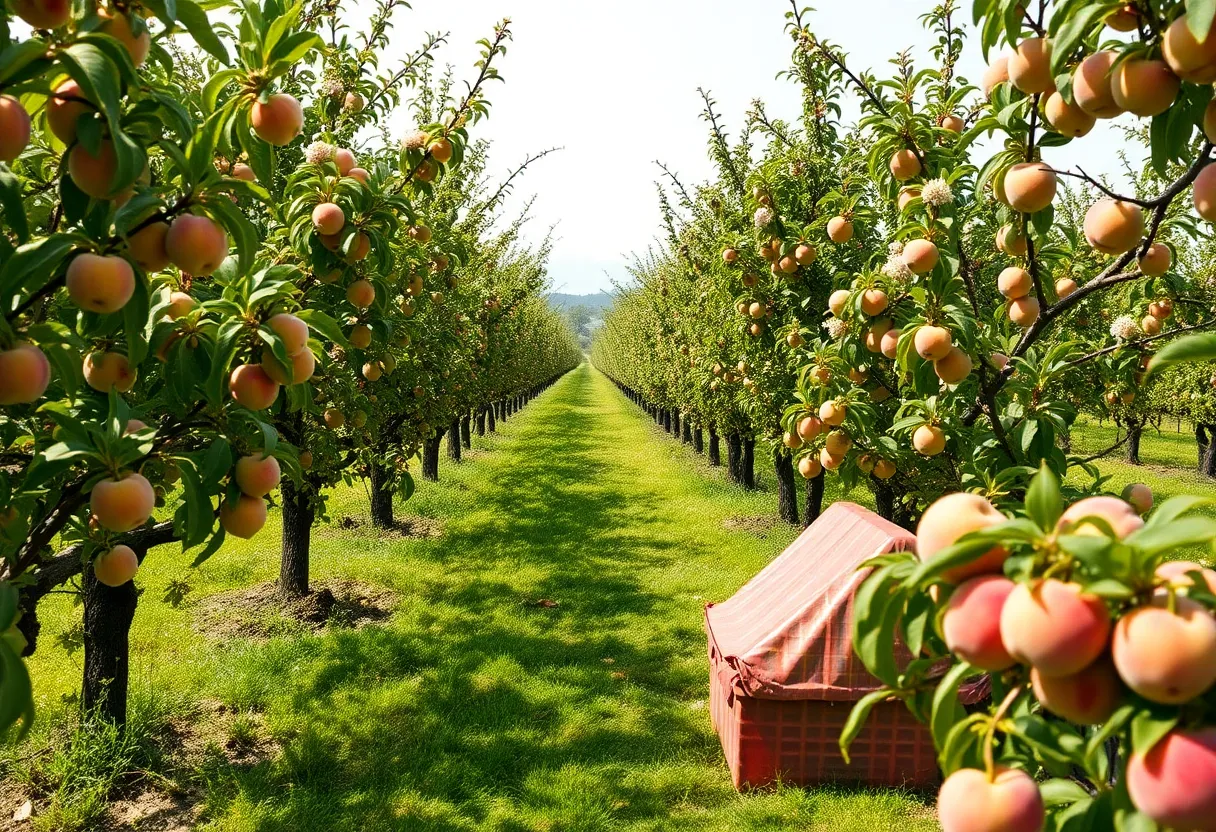News Summary
California’s Central Valley has experienced a significant 30% decline in peach harvests this year, primarily attributed to climate change challenges. The Masumoto Family Farm, recognized for its premium peaches, faces severe economic pressures as warmer winters disrupt the essential nutrient regulation cycles of peach trees. This situation has led to increased prices for consumers and ongoing worries about the future of peach farming, as farmers adapt to these challenging climate conditions.
California – Peach harvests in California’s Central Valley have plummeted by 30% this year, primarily due to significant climate change challenges. The Masumoto Family Farm, renowned for its high-quality peaches, has felt the brunt of warmer winters that have disrupted the crucial sleep cycles of peach trees, essential for their nutrient regulation.
Farmers are facing dire economic consequences as many rely on the 12-week peach harvest as their primary source of income. The necessity for the trees to receive a specific number of hours below 45 degrees to maintain their sleep cycle has become increasingly challenging due to inconsistent cold weather patterns during the past winter. Many growers have reported substantial crop failures, with some having no peaches at all as a result of disrupted cycles affecting not only peaches but also other stone fruits like plums, apricots, and cherries.
As a result of the reduced harvests, consumers are beginning to feel the impact through higher prices at the grocery store. The cost of yellow peaches has risen by 23 cents per pound, while white peaches have seen an increase of 17 cents per pound. The Masumoto family, though faced with challenges, has managed to utilize older groves and traditional furrow irrigation methods—known for maintaining soil health—enabling them to pack and ship approximately 10,000 pieces of fruit daily.
However, many farmers are growing increasingly anxious about the long-term viability of peach farming amidst ongoing climate issues. In South Carolina, peach growers are facing similar predicaments, with a recent late freeze destroying about 70% of their harvest. Experts from Clemson University have noted that neighboring Georgia has seen an even greater loss, with only about 5% of its peaches remaining post-freeze due to climate conditions.
Peach farming is inherently labor-intensive and sensitive to temperature fluctuations, making it particularly risky compared to other agricultural ventures. To mitigate potential losses, farmers are employing various strategies such as crop insurance and investing in protective measures, including wind machines and burning straw to protect the blossom during frosty conditions. This warmer winter has also led to earlier blooming of peaches, affecting the timing of the harvest and increasing vulnerability to frost damage.
Despite these challenges, agricultural experts express cautious optimism for future peach production, citing advancements in the development of peach varieties that require fewer chill hours. In the past, Georgia was the leading producer of peaches before South Carolina surpassed it in yield. However, both states are now grappling with a resurgence of diseases such as phony peach disease (PPD), which affects the quality and yield of peach crops.
Peach farming has a significant economic impact, particularly in South Carolina, where approximately 15,500 acres of peach orchards contribute over $98 million to the state’s economy. This underscores the fruit’s importance to the region’s agricultural identity and financial framework. Increasing awareness of the challenges faced by peach farmers may foster better understanding and support throughout the industry.
As the climate continues to change, the future of peach farming remains uncertain. Farmers are left to adapt to these evolving conditions while striving to maintain both the quality and quantity of their beloved crops.
Deeper Dive: News & Info About This Topic
- CBS News
- The Guardian
- The New York Times
- Fox Weather
- Science Direct
- Wikipedia: Peach
- Google Search: peach harvest climate change
- Google Scholar: peach farming climate change
- Encyclopedia Britannica: peach farming
- Google News: peach harvest

Author: STAFF HERE MISSION VIEJO WRITER
The MISSION VIEJO STAFF WRITER represents the experienced team at HEREMissionViejo.com, your go-to source for actionable local news and information in Mission Viejo, Orange County, and beyond. Specializing in "news you can use," we cover essential topics like product reviews for personal and business needs, local business directories, politics, real estate trends, neighborhood insights, and state news affecting the area—with deep expertise drawn from years of dedicated reporting and strong community input, including local press releases and business updates. We deliver top reporting on high-value events such as Oso Fit 5K Fun Run and Community Health Fair, Walk Against Drugs & Community Fair, and National Night Out. Our coverage extends to key organizations like the Mission Viejo Chamber of Commerce and Providence Mission Hospital Mission Viejo, plus leading businesses in retail and education that power the local economy such as The Shops at Mission Viejo, Capistrano Unified School District, and Amazon Delivery Station. As part of the broader HERE network, including HEREAnaheim.com, HEREBeverlyHills.com, HERECostaMesa.com, HERECoronado.com, HEREHollywood.com, HEREHuntingtonBeach.com, HERELongBeach.com, HERELosAngeles.com, HERESanDiego.com, and HERESantaAna.com, we provide comprehensive, credible insights into California's dynamic landscape.


